The Power of Protein for Women’s Weight Loss
For many women, the quest for weight loss can often feel like an uphill battle, filled with confusion, frustration, and misinformation.
A fundamental understanding of the essential role of protein for women’s weight loss can be a game-changer in this journey.
In this article, we will explore the importance of protein, particularly for women, in achieving and maintaining weight loss.
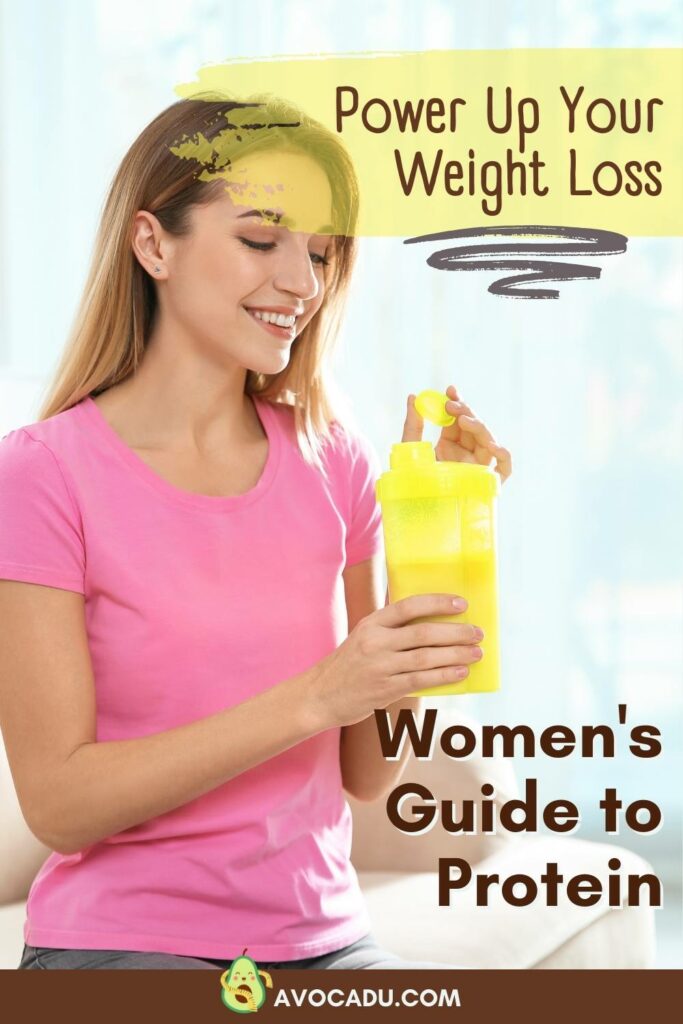
This post may contain affiliate links, which helps keep this content free. Please read our disclosure for more info.
Understanding Protein
Protein is one of the big three macronutrients, right alongside carbohydrates and fats. Its name comes from the Greek word “proteios,” which means “primary” or “in the lead.” And trust me, it definitely lives up to its name.
Think of proteins as complex puzzles, made up of smaller pieces called amino acids.
We have twenty different amino acids in total, and out of those, nine are “essential.” These are ones your body can’t whip up on its own, so you have to make sure you’re getting them from the foods you’re eating.
One of the main gigs protein has is being the body’s builder. It’s like the ultimate handyman for your body, building everything from muscles and ligaments to skin, hair, and nails.

It also forms the structure of your cells. So, when you’re hitting the weights and creating those tiny tears in your muscles, it’s protein that steps in, fixes them up, and helps your muscles grow.
But protein’s resume doesn’t stop at construction. It’s also a key player in the function and regulation of your body’s tissues and organs.
For example, hemoglobin, which is a protein, acts like a delivery service, transporting oxygen all around your body. This helps keep your energy levels steady and your body running smoothly.
And there’s more. Protein is a critical ally in maintaining your general health. It helps your immune system function properly by producing antibodies – those helpful agents that battle infections and diseases.
Proteins also help create hormones, like insulin, which helps keep your blood sugar levels under control, and enzymes, those trusty catalysts that drive all the biochemical reactions in your body.
Finally, let’s not forget about the beauty benefits. Protein plays a starring role here too. It’s the main ingredient in keratin, which is what your hair and nails are made of, and collagen, which helps keep your skin looking fresh and youthful.
Proteins are a pretty big deal. They’re vital to nearly every aspect of your body’s structure, function, and overall health.
Protein and Weight Loss
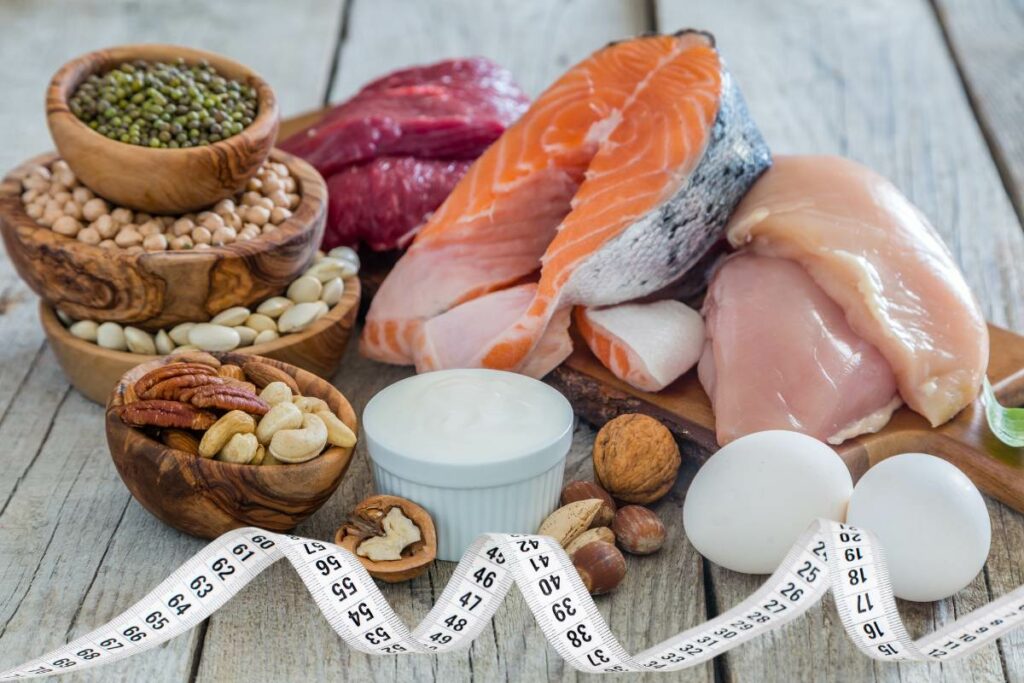
Let’s get into the nitty-gritty about protein and weight loss. As more and more scientific research pours in, it’s becoming crystal clear that protein packs a serious punch when it comes to shedding those pounds.
First off, let’s talk about fullness. Ever notice how a protein-rich meal leaves you feeling more satisfied than a carb-heavy one?
That’s protein working its magic. It helps keep your hunger pangs in check and reduces those snack cravings, ultimately leading to a lower overall caloric intake.
So, if you’re looking to keep your calorie count on the down-low without feeling like you’re starving, protein should be your go-to.
Then, there’s the thermogenic effect of protein. Sounds super scientific, right? But it’s actually quite straightforward.
Your body needs energy to digest, absorb, and process the food you eat. This energy is measured in calories.
Here’s where protein takes the lead: it requires more energy to be processed than other macronutrients, meaning you’re burning more calories just by eating it.
This is why you might hear that protein can ‘boost’ your metabolism – it’s all thanks to this thermogenic effect.
And let’s not forget about muscles. During weight loss, the goal isn’t just to drop pounds; you want to make sure you’re losing fat, not muscle. This is where protein steps up.
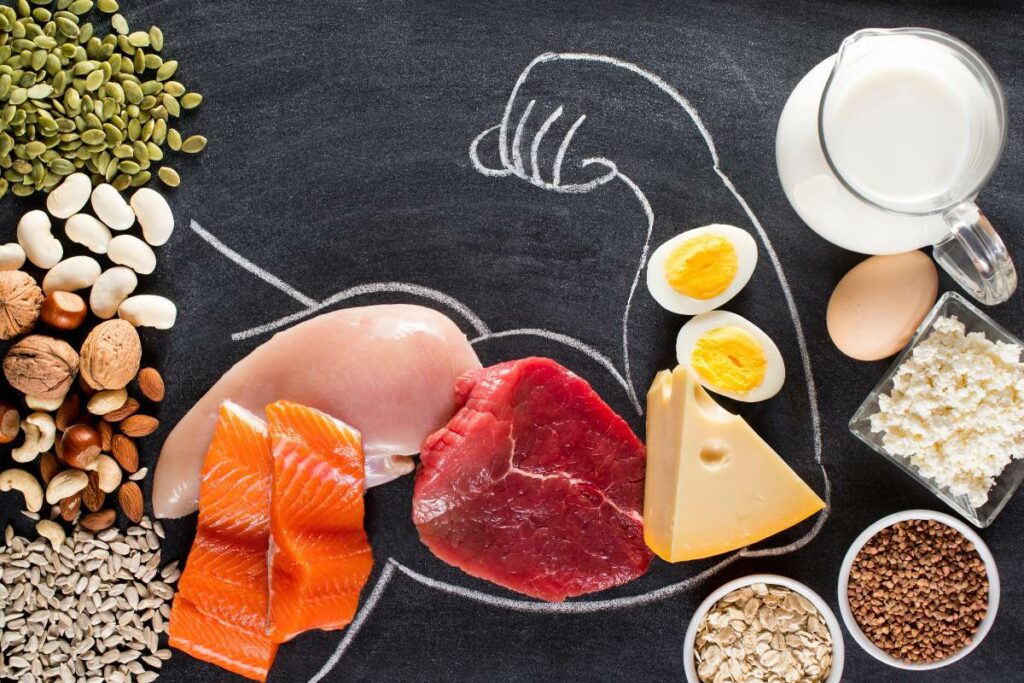
It helps preserve your muscle mass while you’re losing weight, which in turn maintains your metabolic rate – that’s the rate at which your body burns calories.
So, the more muscle you retain, the more calories you can burn, even at rest. Pretty cool, right?
But there’s another aspect we haven’t touched on yet: the protein leverage hypothesis. This theory suggests that we humans are programmed to prioritize protein intake.
That means that your body will keep telling you it’s hungry until it gets enough protein. If your diet is low in protein, this can lead to overeating as your body tries to satisfy its protein quota.
So, by upping your protein intake, you could help keep overeating at bay.
All in all, protein is a powerful ally in the battle against the bulge. By keeping you fuller for longer, increasing your calorie burn, preserving your muscle mass, and potentially preventing overeating, it’s a pretty big player in the weight loss game.
Related Article: 10 Yummy High Protein, Low Carb Snacks
The Importance of Protein for Women

Women have unique nutritional needs, and protein plays a key part in meeting them. From combating certain health issues to dealing with hormonal fluctuations, protein is a pretty important player.
Protein is a bit of a superhero when it comes to fighting some health issues that we, as women, are more prone to.
One big one is osteoporosis. You see, our bones aren’t just static structures; they’re continually being broken down and rebuilt.
Protein plays a significant role in that rebuilding process. So, maintaining a good intake of protein can be really beneficial in preventing bone loss and fighting conditions like osteoporosis.
Then there’s lean mass loss. As we age, it’s normal for us to lose some of our muscle mass. But protein, being the muscle builder that it is, can help slow down that process.
So, if you’re looking to stay strong and lean as you get older, keeping protein front and center in your diet is a smart move.
And let’s not forget hormones. If there’s one thing we know, it’s that hormones can take us on quite the ride.
Fluctuations during menstrual cycles, pregnancy, and menopause can all impact your body in different ways, and one of those ways is by affecting your protein needs.
For example, during menopause, hormonal changes can lead to increased muscle loss, which can up your protein needs.
And, during pregnancy, you’re building a whole new human, which can also mean you need a bit more protein.
So, all in all, protein isn’t just about building muscles or losing weight. For us women, it plays some crucial roles that can have a real impact on our health and well-being.
By keeping it a key part of our diet, we can tackle some of these unique challenges and keep ourselves feeling strong, healthy, and balanced.
Incorporating Protein into Your Diet
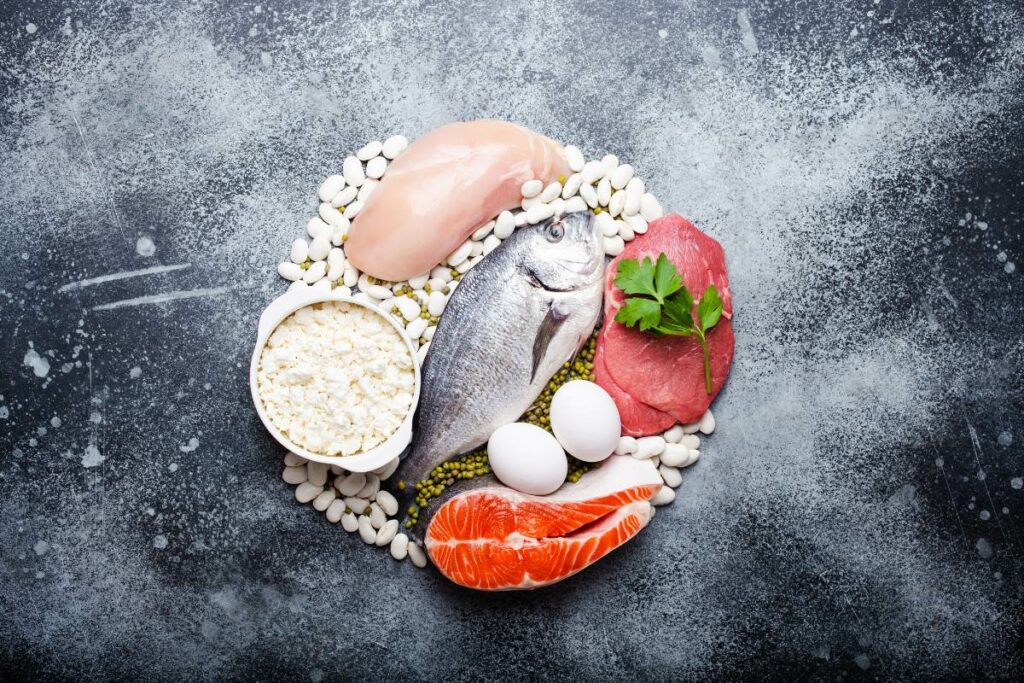
Now that you’re all clued up on the power of protein, how can you make sure you’re getting enough of it in your diet?
Good news: there are plenty of tasty, protein-packed foods out there, and with a few tips and tricks, it’s pretty easy to bump up your protein intake.
First, let’s talk about mealtime. Try to make protein a star player in every meal you have.
Now, that doesn’t mean you have to pile on the steaks. There’s a whole variety of protein sources you can choose from, both from the animal and plant kingdom.
For animal-based proteins, think lean meats like chicken or turkey, fish like salmon or tuna, and dairy products like milk and cheese.
And don’t forget eggs – they’re a real protein powerhouse and super versatile, too.
There are also plant-based proteins. If you’re vegetarian, vegan, or just looking to reduce your meat intake, these are great alternatives.
We’re talking lentils, quinoa, and tofu, all of which are chock full of protein. And hey, they’re also great ways to add some variety to your diet, even if you’re a meat-eater.
Now, let’s not overlook snacks. You might be surprised how much protein you can pack into your between-meal nibbles.
Greek yogurt, for instance, is super creamy and satisfying, and it’s got a good amount of protein. Nuts, like almonds or peanuts, are another great choice, and they’re perfect for on-the-go snacking.
And then there are protein-rich smoothies. Blend up some protein powder, fruits, and yogurt or milk, and you’ve got yourself a delicious, protein-packed drink.
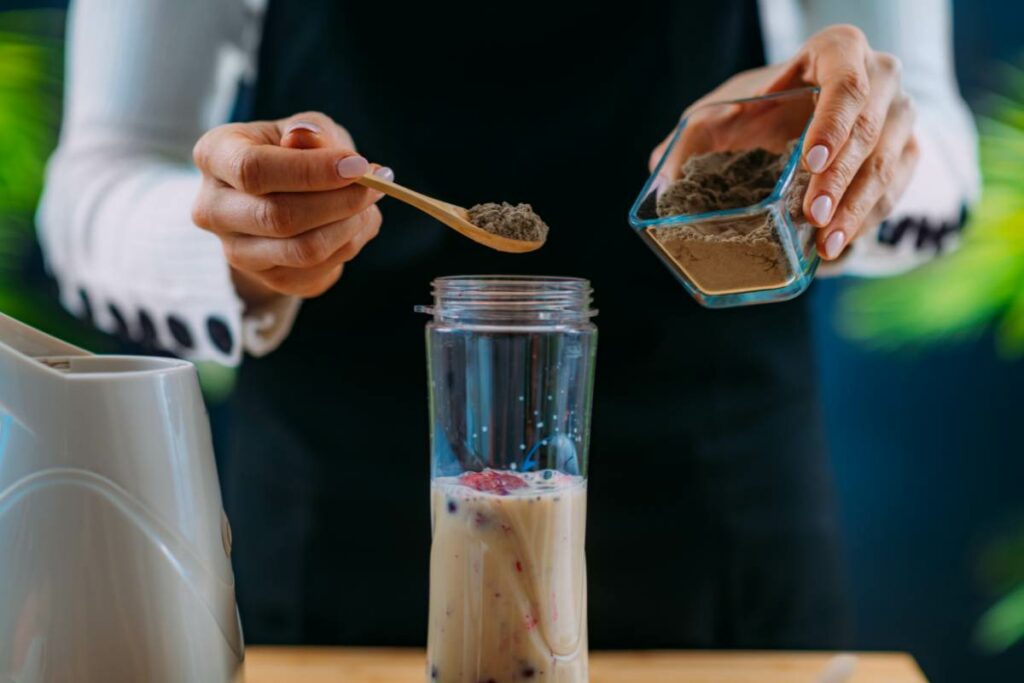
Speaking of protein powder, let’s touch on protein supplements. They can be a handy way to up your protein intake, especially if you have high protein needs or are struggling to get enough from your diet alone.
But remember, whole foods are generally the better option. They not only provide protein but also offer a bunch of other nutrients and fiber that your body needs.
With a little bit of planning and a variety of foods, you can easily incorporate more protein into your diet, harnessing its power for your health and weight loss goals.
Precautions and Potential Drawbacks
While protein is an absolute superstar nutrient, it’s important to remember that it’s possible to have too much of a good thing.
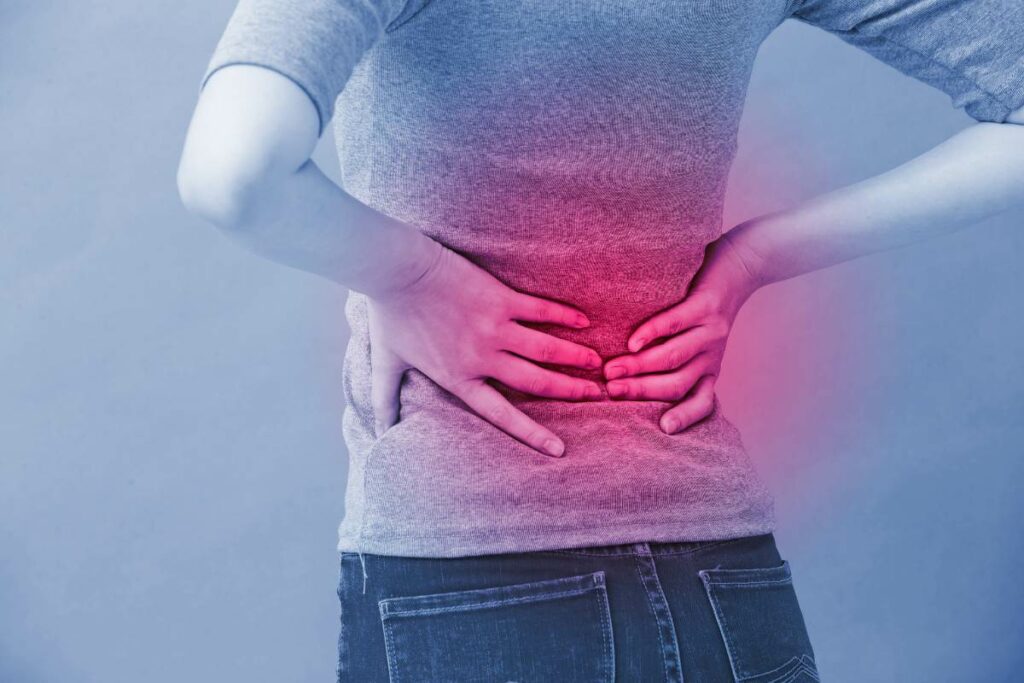
Now, it’s pretty rare, but consuming excessive amounts of protein could potentially put a strain on your kidneys.
The key word here is ‘excessive.’ We’re talking about really high levels of protein consumption, far more than what most people would ever eat.
For the vast majority of healthy individuals, a high-protein diet isn’t going to cause kidney problems.
But if you have a pre-existing kidney condition, it’s a good idea to check in with your doctor before significantly upping your protein intake.
Another thing to keep in mind is that, while protein is important, it shouldn’t crowd out other crucial food groups in your diet.
For example, you don’t want to be eating so much protein that you’re skimping on your fruits, veggies, or whole grains.
These food groups provide a whole host of other nutrients that your body needs to function properly, so make sure you’re still getting a good balance.
Now, how do you know if you might be overdoing it with the protein? Some signs to look out for include bad breath, mood changes, or digestive issues.
Again, these symptoms from too much protein are pretty rare, but if you’re experiencing them, it might be worth checking in with a healthcare professional.
While it’s clear that protein has a whole heap of benefits for weight loss and overall health, it’s all about balance.
As long as you’re eating a variety of foods and not going overboard with your protein intake, you can harness the power of protein while still keeping your diet well-rounded and nutritious.
Recommended Protein Intake and When to Increase It

How much protein should you be aiming for each day? According to the Mayo Clinic, protein should account for 10% to 35% of your diet.
The recommended dietary allowance to prevent deficiency for an average sedentary adult is 0.8 grams per kilogram of body weight.
However, these recommendations can vary depending on your age, level of physical activity, and overall health.
If you’re a highly active woman, especially if you’re into strength training or endurance sports, your protein needs might be higher – around 1.2 to 2.0 grams per kilogram of body weight.
Why? Remember how protein is the master muscle builder? Well, when you’re working out, especially with weight training, you’re causing those tiny tears in your muscles.
Higher protein intake helps to repair those tears and build more muscle, aiding in recovery and improving performance.
Pregnancy and breastfeeding are other times when you might need to increase your protein intake.
Growing a baby or providing nutrition through breast milk requires extra protein, so expectant and new mothers often need more protein.
Similarly, as we get older, we naturally start to lose some of our muscle mass. To help counter this, older adults may also benefit from a slightly higher protein intake, which can help preserve lean mass and strength.
If you’re aiming to lose weight, upping your protein intake can be beneficial as well.
As we talked about earlier, protein can help keep you feeling full, preserve your muscle mass, and even give your metabolism a bit of a boost – all of which can support healthy and sustainable weight loss.
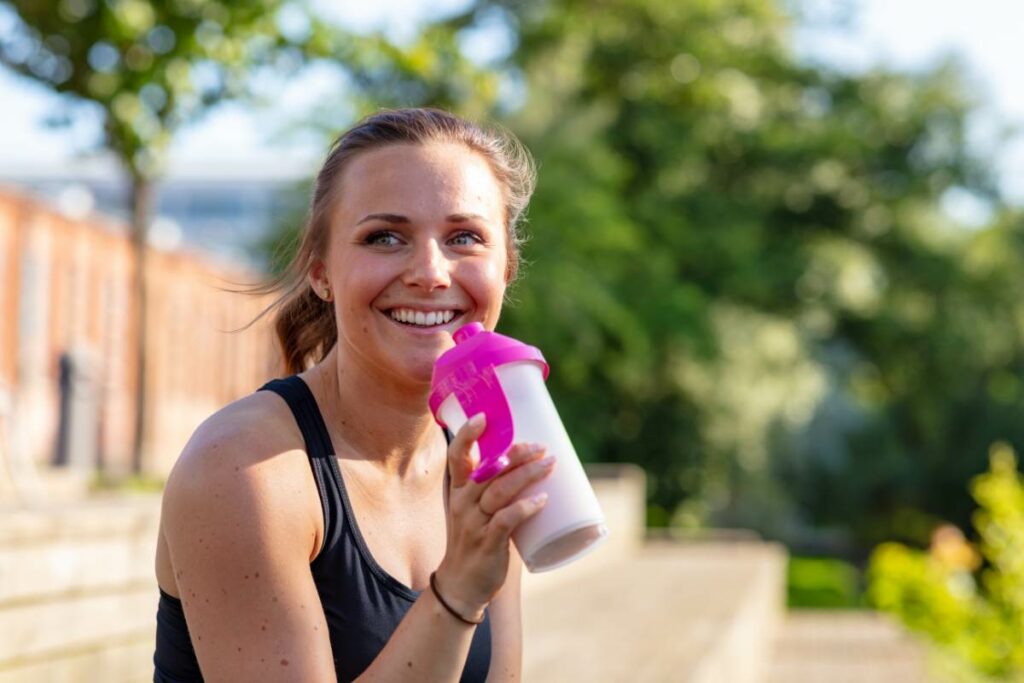
And one last note here – while it’s useful to have these general guidelines, everyone’s needs are unique. So if you’re not sure about how much protein you should be eating, it’s always a good idea to check in with a registered dietitian or healthcare provider.
They can provide guidance that’s tailored specifically to you, taking into account your individual goals, activity level, and overall health.
Unlocking the Power of Protein
To wrap it all up, protein is a pretty powerful player in a woman’s weight loss journey. Whether it’s helping to keep your hunger in check, preserving your lean muscle mass, or boosting your metabolism, harnessing the power of protein can be a seriously effective strategy.
But remember, there’s no one-size-fits-all when it comes to protein intake. Your protein needs might look different from your best friend’s, your sister’s, or that fitness influencer you follow on Instagram.
Factors like your age, activity level, overall health, and personal goals all play a part in determining how much protein is right for you.
And if you’re looking for a guided approach to weight loss that incorporates these principles, consider joining a program like the 21-Day Fat Loss Challenge.

This program takes into account the essential role of protein, helping you to incorporate it into your diet in a balanced and sustainable way.
It could be just what you need to kickstart your weight loss journey and unlock the power of protein.
So, here’s to protein, to balanced nutrition, and to feeling your best. Here’s to finding what works for you and embracing the journey.
Because when it comes to weight loss and overall health, you’re in the driver’s seat – and protein? Well, it’s a pretty powerful fuel.
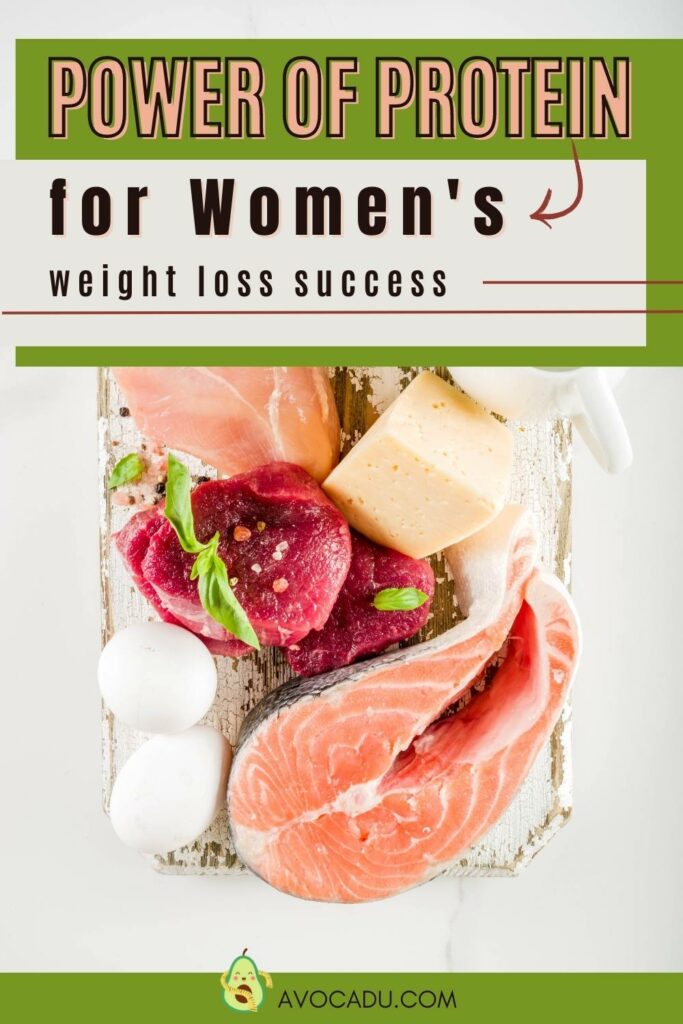
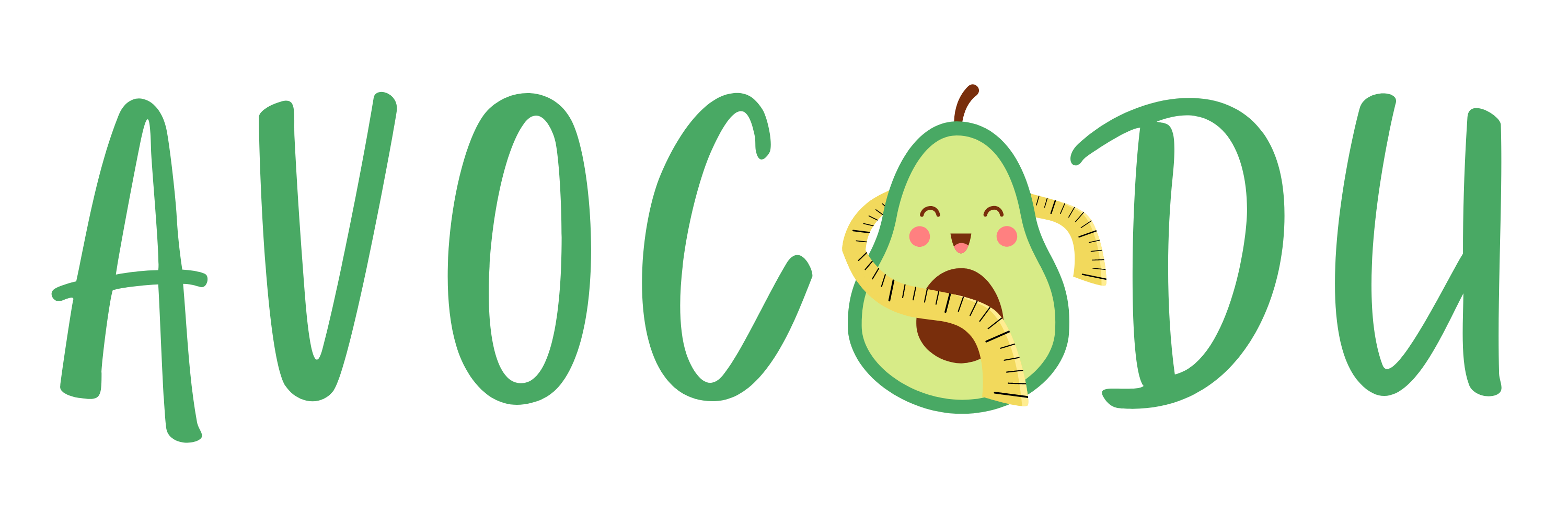
I wish more women understood the importance of protein intake. So important especially after 40s!
100% agree!!